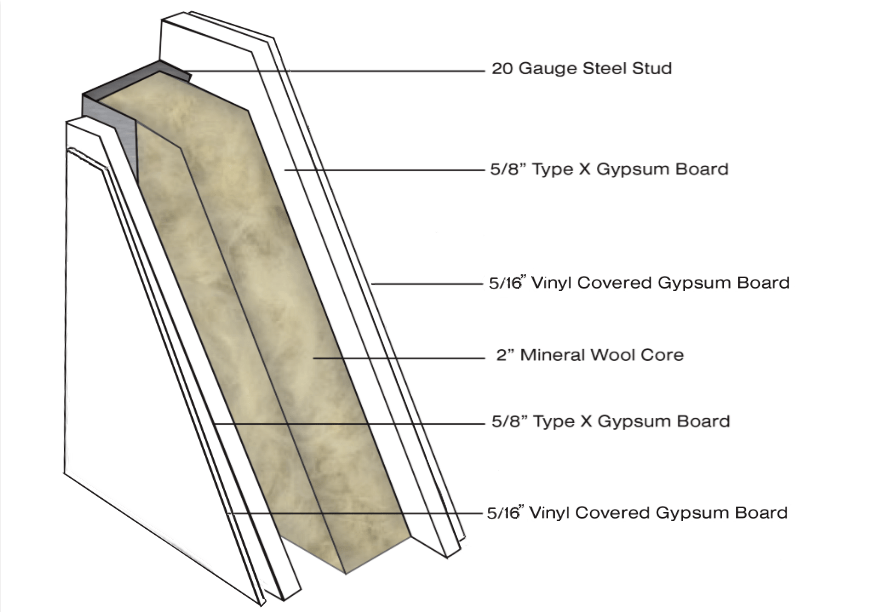What is gypsum board?
Gypsum board, also known as drywall or plasterboard, is a panel made of calcium sulfate dihydrate. Typically extruded between thick sheets of facer and backer paper, used in the construction of interior walls and ceilings. It has been in use since the early 20th century. and has evolved over time to become a popular building material for residential, institutional, and commercial structures. Key features of gypsum board include.
Non-combustible core: Gypsum board comprises a non-combustible core made of gypsum, which contributes to its fire resistance.
Paper surfacing: Gypsum board has a paper surfacing on the face, back, and long edges. which adds strength and durability to the panel.

Variety of thicknesses: Gypsum board is available in various thicknesses, such as 1/4-inch, 3/8-inch, and 1/2-inch. each suitable for different purposes, such as base layers, face layers, or sound control.
Fire resistance: Gypsum board has inherent fire resistance, making it a suitable choice for wall, ceiling, and partition systems.
Moisture resistance: Some gypsum board types, known as moisture-resistant gypsum plasterboard or green boards, have green covering provides moisture resistance.
Gypsum board is used for creating light walls and can be applied over wood framing, usually in a double-layer format. When the joints and fastener heads are covered with a joint treatment system, gypsum board creates a monolithic surface. providing sound control, economy, versatility, quality, and convenience.
Gypsum board types
There are several types of gypsum board available in the market, each with its specific properties and uses. Some of the common types include below items.
Regular Gypsum Board. This is the most common type of gypsum board, used as a covering material for walls, ceilings, and partition walls. It is available in various sizes and thicknesses, and can be found with square, tapered, or beveled edges.
Water-Resistant Gypsum Board. This type of gypsum board is suitable for areas with high moisture levels, such as bathrooms and kitchens. It is available in square, tapered, and beveled edges and comes in various sizes.
Fire-Resistant Gypsum Board. These boards are designed to provide fire resistance in building structures. They have a core reinforced with fibreglass for added fire protection and can be used in various applications. including walls, ceilings, and partitions.
Exterior Gypsum Board. This type used as covering material for wall cladding in commercial and residential exterior applications with indirect exposure to weather. It provides fire resistance, additional structural strength, and water resistance when used under exterior finishes.
Sound-Absorption Gypsum Board. These boards are designed to reduce noise transmission through walls and ceilings. They have a special core and paper surfacing that help absorb sound and reduce noise levels in a space.
Extra-Strong Gypsum Board. This type of gypsum board has a stronger core and is more durable than regular gypsum board. It is suitable for areas with high foot traffic or where extra strength is required.
When selecting gypsum board for specific application, it’s essential to consider desired properties and performance characteristics to ensure best results.
Gypsum board application in construction

Gypsum board has numerous applications in construction, making it a versatile and popular building material. Some of its common applications include these.
Wall, ceiling, and partition systems. Gypsum board is used to create lightweight and durable walls, ceilings, and partitions in residential, institutional, and commercial structures.
Fire-resistant constructions. Gypsum board is used to provide fire resistance in building structures, thanks to its non-combustible core.
Sound-absorption. Gypsum board is designed to absorb sound and reduce noise transmission through walls and ceilings. making it suitable for use in schools, hospitals, and other noisy environments.
Exterior applications. Gypsum board can be used as an exterior wall cladding material. providing fire resistance, additional structural strength, and water resistance when used under exterior finishes.
Specialty panels. Manufacturers have developed specialized performance panels, such as impact-resistant gypsum panels for hospitals and abuse-resistant gypsum panels for schools. to address specific design challenges.
Gypsum shaftliner. This is a specialized gypsum board product used as a liner for vertical shafts in commercial buildings. providing fire resistance and sound isolation.
Gypsum board is easy to process, install, and maintain, making it a convenient choice for construction professionals and homeowners alike. Its monolithic surface, when properly treated, provides sound control, economy, versatility, quality, and convenience.
